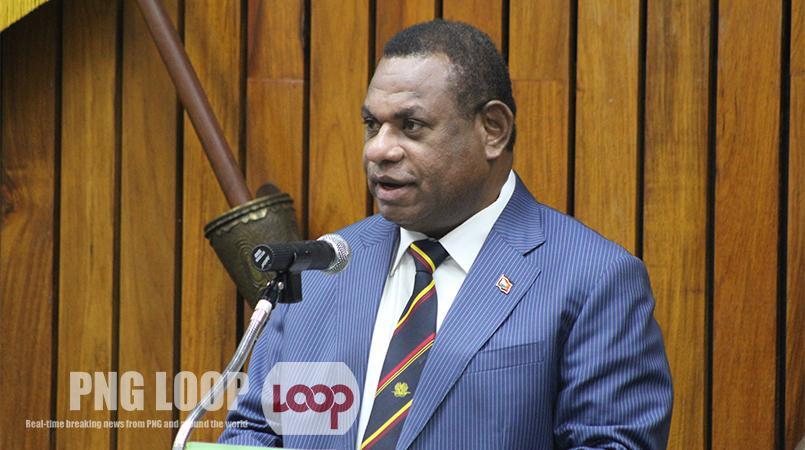
An appeal in the Supreme Court by Aitape-Lumi MP Patrick Pruaitch, seeking the disclosure of investigation documents, has been dismissed by a three-judge Supreme Court bench.
Pruaitch was seeking discovery of the Ombudsman Commission’s investigation documents in the appeal, which challenges a decision of the National Court from Dec 2014 after the lower court rejected a motion he was seeking in a civil proceeding.
This was after he became subject to investigation by the Ombudsman Commission, during his term as the Minister for Forestry from 2002-2007, regarding allegations of misconduct in office against him under the Leadership Code.
He was seeking the disclosure of investigation documents that was obtained by the Ombudsman Commission from the National Forest Authority when he became subject of investigation.
The appeal was filed on seven grounds, and that the Judge who heard a motion he filed in the National Court failed to consider the submissions and the legal principles in relation to discovery and erroneously refused the motion.
Justices George Manuhu, Jacinta Murray and Frazer Pitpit, on Dec 15, 2015, heard the appeal filed by Pruaitch against the decision of Justice Stephen Kassman from December 2014.
They refused the orders sought and dismissed the appeal accordingly. But the Supreme Court bench said Pruaitch would be at liberty to resurrect his application for discovery if he was found guilty by the Leadership Tribunal.
The leadership tribunal has been delayed for more than eight years.
“The delay has seriously undermined the Ombudsman Commission, the Organic Law and all efforts to promote good governance in the country,” the full court said.
“The appellant has continued to be a Member of Parliament in the last eight years. If he loses in the coming elections, the Commission’s investigations and resources spent on the investigation would be a waste of public funds,” the three judges said in their ruling.
The Supreme Court noted that Pruaitch has the right to challenge the proceeding of the Ombudsman Commission in obtaining the documents in relation to its investigation against him, but it was also in the interest of the public that the proceeding of the OC, or the leadership tribunal, should not be compromised or tampered with.
“They are materials obtained by law for a specific purpose, that is, to present to the Leadership Tribunal as evidence. Until they are presented, it is not in the public interest for those materials to be released to and used by the appellant (Pruaitch) in an irrelevant proceeding,” the full court said.
In relation to proceedings under the Leadership Code, we are also of the view that the National Court, in its civil jurisdiction, should not interfere with proceedings of the process under the Leadership Code.
Proceedings under the Leadership Code are sanctioned by an Organic Law - not any ordinary Act of Parliament.
For that reason alone, the full court said an aggrieved person enforcing his private right should not be allowed to interfere with the proceeding when it is still in progress.
“Secondly, a leader found guilty does not lose his right to challenge the proceeding of the Ombudsman Commission and any adverse finding of a Leadership Tribunal. With his right preserved, it is against public interest for a leader to interfere midstream with a proceeding under the Leadership Code.
“In this case, for instance, the appellant’s right to challenge his referral will not be lost if he is found guilty,” the full court added.
The Supreme Court was also of the view that the National Court proceeding, by way of Originating Summons, was instituted prematurely and that a cause of action in a case like this matures only when a leader is found guilty and penalised after a leadership tribunal.
“In other words, the constitutional process has to be completed before any challenge can be made against the process, including decisions made by the Ombudsman Commission, the Public Prosecutor or the Tribunal. But if a leader is found not guilty, there would not be any cause of action against the constitutional process.”
The Supreme Court said when civil suits are entertained prematurely, the same cause of action is thus subjected to two different processes. This will more likely result in delays.
“Delays in the prosecution of leaders charged with misconduct offences undermine good governance and the public loses confidence in the systems of government.
“This case is a classic example. The referral was made on 22nd July 2009. The OS proceeding was filed in February 2010. To date, there has been a delay of more than eight years.
“It is not in the public interest for documents and materials that were relied upon by the Commission to refer the appellant (Pruaitch) to the Public Prosecutor to be discovered in the OS proceeding when the Leadership Code proceeding has not been concluded,” the Supreme Court said.
The case in the National Court that was filed by Pruaitch listed Chronox Manek, John Nero and Phoebe Sangetari, from the Ombudsman Commission, as the first respondents.
Jim Wala Tamate and the Public Prosecutor are the second respondents; members of the tribunal are the third respondents while the State is the fourth.
Pruaitch was referred to the tribunal in 2008 over allegations of misconduct in office following investigations by the OC.
The allegations included double-dipping into support vehicle allowances, double-dipping into operational cost allowances for support vehicles, improper receipts of public funds for fuel costs for private vehicles, double-dipping into entertainment allowances and misappropriation of 2003 district support grants.
A tribunal was appointed, which consisted of Justice Sir Gibbs Salika (now Deputy Chief Justice), Senior Magistrate Peter Toliken (now Justice Toliken) & Nerrie Eliakim (now Chief Magistrate) back in 2008.
That tribunal has been stayed pending numerous appeals.
